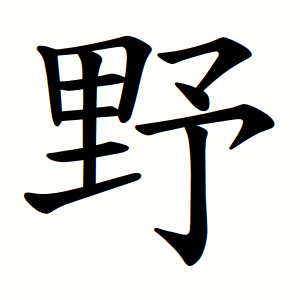野
- field;
- area;
Etymology
It is a phono-semantic compound formed from:
里 (“village, settlement”), which indicates meaning,
予 (“I, me”), which serves as the phonetic element.
However, in its earliest forms in oracle bone inscriptions and bronze script, this character appeared as 埜, a compound of 林 (“forest”) and 土 (“earth”), originally a pictograph-ideograph depicting a plain or field made up of trees and soil.
By the time of seal script, a number of variant forms had developed:
and others.
Eventually, the form with 里 + 予 prevailed and continues in use today as 野. Among its variant forms, 埜 still occasionally appears in personal names and place names.
Alternative forms
(old or jinmeiyō form) 埜
Words that derived from 野
- 광야(曠野/廣野)–field; grassland; green; pasture
- 발야구(발野球)–kickball
- 분야(分野)–field; sphere
- 야구(野球)–baseball
- 야구장(野球場)–baseball park; baseball stadium
- 야만(野蠻)–barbarism; barbarity; savagery
- 야만인(野蠻人)–barbarian; savage
- 야심(野心)–ambition; aspiration; vulgarity; meanness
- 야채(野菜)–vegetable
- 프로 야구(professional 野球)–professional baseball
- 하야(下野)–resignation; stepping down
- 황야(荒野)–wilderness; wasteland
野
들
야
deul
ya
Kangxi radical:166, 里 + 4
Strokes:11
Unicode:U+91CE
Cangjie input:
- 田土弓戈弓 (WGNIN)
Composition:
- ⿰ 里 予
